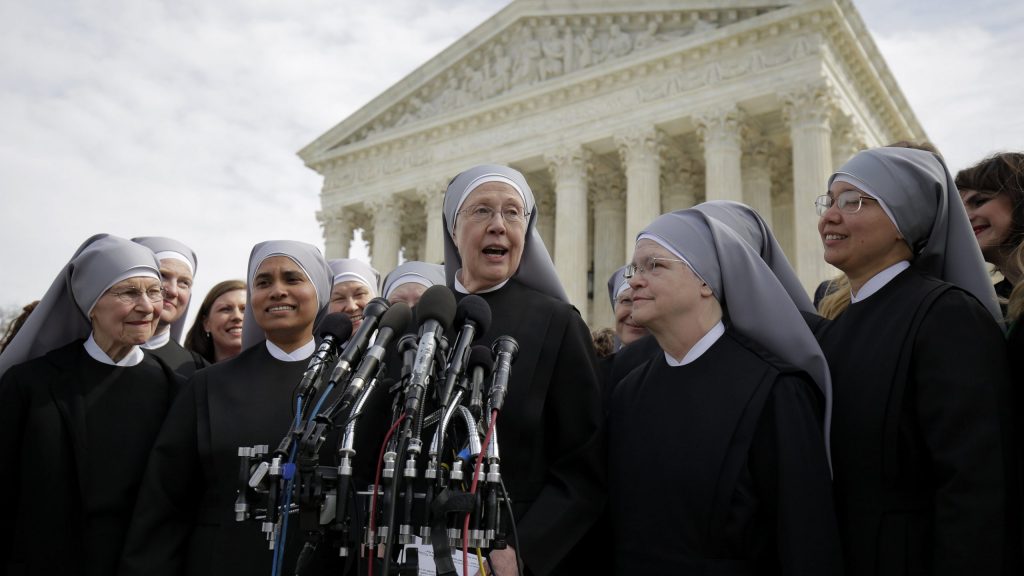Catholic leaders and religious liberty advocates have welcomed the Supreme Court ruling in favor of the Little Sisters of the Poor on Wednesday, calling it a victory for freedom of conscience and the freedom of religious people to serve the poor.
“We are overjoyed that, once again, the Supreme Court has protected our right to serve the elderly without violating our faith,” said Mother Loraine Marie Maguire of the Little Sisters in a statement July 8.
“Our life’s work and great joy is serving the elderly poor and we are so grateful that the contraceptive mandate will no longer steal our attention from our calling.”
The Little Sisters’ victory at the Supreme Court on Wednesday comes nine years into their legal fight against the Obama-era “contraception mandate” which obliges employers to provide cost-free coverage for contraceptives, sterilizations, and “emergency birth control” in employee health plans under the Affordable Care Act (ACA).
In 2017, the Trump administration granted a religious and moral exemption to the mandate for the sisters and other objecting groups, but then states including Pennsylvania and California filed lawsuits saying that the burden of providing coverage was being shifted onto the states and claiming that the administration violated the Administrative Procedure Act in setting up the exemption.
On Wednesday, the court found that the Trump administration “had the statutory authority to craft that exemption, as well as the contemporaneously issued moral exemption,” and “that the rules promulgating these exemptions are free from procedural defects.”
Mark Rienzi, president of Becket, the religious freedom legal group which represented the sisters, said Wednesday that “America deserves better than petty governments harassing nuns.”
“The court did the right thing by protecting the Little Sisters from an unnecessary mandate that would have gutted their ministry,” Rienzi said. “Governments don’t need nuns to distribute contraceptives. But they do need religious groups to care for the elderly, heal the sick and feed the hungry.”
Referring to the states of California and Pennsylvania, which initiated the latest round of legal action against the sisters, he said that “these governments all have real work they ought to be doing rather than dividing people with old and unnecessary culture wars.”
Archbishop Thomas Wenski of Miami, chairman of the U.S. bishops’ religious liberty committee, also issued a statement together with Archbishop Joseph F. Naumann of Kansas City in Kansas, who chairs the committee on pro-life activities, calling the verdict “welcome.”
“This is a saga that did not need to occur. Contraception is not health care, and the government should never have mandated that employers provide it in the first place,” the bishops wrote.
“There were multiple opportunities for government officials to do the right thing and exempt conscientious objectors,” they said. “Time after time, administrators and attorneys refused to respect the rights of the Little Sisters of the Poor, and the Catholic faith they exemplify, to operate in accordance with the truth about sex and the human person.”
The bishops said that the Little Sisters are “committed to building a culture of life. They care for the elderly poor. They uphold human dignity. They follow the teachings of Jesus Christ and his Church. The government has no right to force a religious order to cooperate with evil.”
The court’s decision Wednesday was widely hailed as a final victory for the sisters after nearly a decade of legal battles, including two trips to the Supreme Court. However, the court’s decision only found in favor of the executive action excusing the sisters and others with conscience objections – action that could be revoked or reversed by a subsequent administration.
The bishops ended their statement on a note of caution:
“We welcome the Supreme Court’s decision. We hope it brings a close to this episode of government discrimination against people of faith. Yet, considering the efforts we have seen to force compliance with this mandate, we must continue to be vigilant for religious freedom.”

